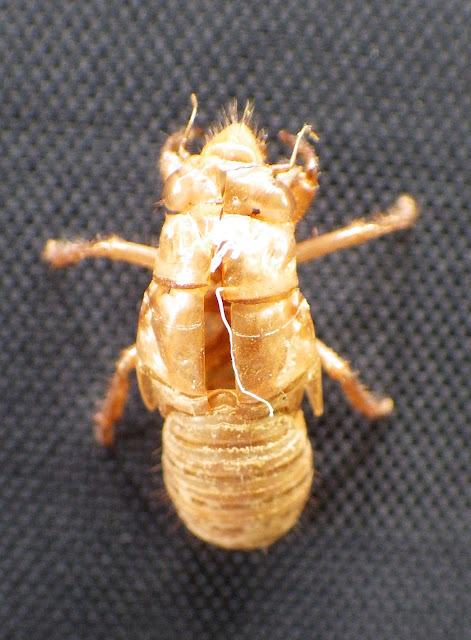The cicadas have come out of the ground and invaded our world. Sebastian and I had seen a few nymphal husks on a tree a week or more ago. Today when I went to load my float tube in the truck I found that the full hatch was underway, and that the tube had been used as a handy launching pad.
I called Sebastian to show him, and we went on a cicada expedition. We found many, many more husks on the porch posts, the shed walls, the bushes and the trees--basically everywhere. There were shoals of husks lying in empty flower beds; the dirt was riddled with emergence holes. We found some dead and dying adults, some with withered wings, one stuck in the husk, and others seemingly in good condition. We picked one up and it fluttered its wings, perhaps just then drying out sufficiently for flight. We left it on a bush. And all the time the lucky ones that had everything go right in their great escape were in the trees overhead sawing away.
Quite a phenomenon. Sebastian was fascinated by it all. He wanted to collect as many husks and dead adults as possible. I picked a small container and fortunately he was satisfied when it was full.
According to some research I did, these are periodical Red Eyed Cicadas. Based on a comparison of the calls and choruses of the three possible species I think these are Magicicada Cassini. They supposedly belong to Brood X (10) and are emerging several years early, which makes them "stragglers."
This is from Cicada Mania:
Brood X stragglers have emerged in Tennessee (around Knoxville), Washington D.C., Virginia (counties around D.C.), Maryland (counties around D.C.), Ohio (around Cincinnati), Delaware, Indiana, Kentucky, Pennsylvania, & New Jersey (around Princeton)! They are chorusing in many locations.
This year precursors to Brood X are emerging or will emerge in small to large numbers in D.C., Delaware, Georgia, Illinois, Indiana, Kentucky, Maryland, Michigan, Missouri, New Jersey, New York (Long Island), North Carolina, Ohio, Pennsylvania, South Carolina, Tennessee, Virginia, and West Virginia.
Note: because of the significant number of cicadas emerging ahead of time, this might be an acceleration event. Periodical cicada accelerations occur when a significant group of an established brood emerge in years ahead of the main brood, and sometimes the accelerated group are able to reproduce and create what is essentially a new brood.
Wow! A new brood!
Of course, all of this makes me think of fishing.
I have an old Orvis fly that is supposed to be a cicada imitation. It's the last one I have of whatever "brood" it was a part of. I've used it here within the last two weeks and have gotten some bumps from bluegill but no hookups. Maybe the cicada hatch hadn't impacted the lake yet. But now, with cicadas coming out of our ears, I'd like to try again.
I also used this fly in Washington when I lived there. One of the memories I have of the fly is of those Trout Lake trout whacking it so hard it would fly up into the air. And yes, contrary to the notion that cicadas are an exclusively eastern phenomenon, we would always see a few out there in the west around May and June.
Here's a cicada I found floating on Trout Lake one Spring afternoon, and here's the trout that ate that old Orvis fly. That was one of my perfect Trout Lake moments.


I'm also remembering a pretty little film about fishing the cicada hatch on the Green River in Utah. I'll throw that on here as the perfect closing, and when I'm finished watching it again I'll begin thinking about tying up some of the cicada flies they were using--with red eyes.






I won't swear to it, but I think we've even had them down here in California. Few and far between though.
ReplyDeleteThanks, Jim, for sharing this post on the Cicadas. Over the years, I have been pretty much oblivious to fishing them or giving them any attention as a fly. However, while visiting in Kansas a few years ago, I was startled one morning with a Cicada I found on the sidewalk outside. That thing was so big it looked like a small airplane!
ReplyDelete